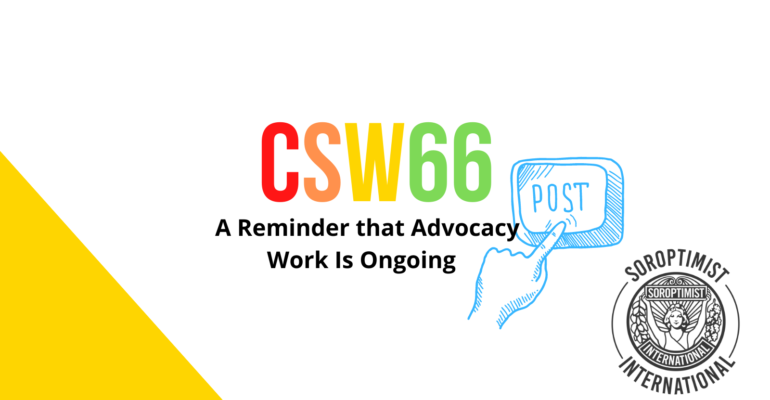By Wanda Price
As NGO CSW66 Forum draws closer to the final day of sessions, we will leave this event well informed on several issues directly affecting women and girls, but also realising there is still more to learn, more to share, and more to do.
This article is not about one event. Instead, it represents a cumulative look back at many of the events that took place during the two-weeks of the forum. However, it is important to reflect on the breadth of the content from all the individual parallel and side events attended during the forum and to become familiar with the process by which the document called the Agreed Conclusion is produced.
A Zero Draft document was referenced numerous times. This document was presented to all UN member states and relevant stakeholders for review prior to the convening of the commission. During the two weeks in which the forum occurred, Member State Caucuses met to strategise on what is most important to their group to recommend as inclusions to the final document. Consensus to the additions and deletions on each section of this lengthy document is required before the Agreed Conclusion is presented to ECOSOC for follow up and approval. Insight into some of the concerns and recommended additions were shared during three civil society briefings to learn more about CSW66 negotiations. Included in these sessions were panelists representing the CSW Bureau Members and UN Women.
High level meetings were occurring concurrently and reflected a strong commitment of governments to participate in these sessions. During the ministerial round table, 92, Vice Ministers intervened (69 in person, which was highlighted as a significant number, and 23 participated by way of pre-recorded videos). In other high-level meetings, two Vice Presidents participated, one head of Government, two Prime Ministers, 98 ministers and 27 high-level officials interfaced.

All parallel events referenced the Priority Theme: Achieving gender equality and empowerment of all women and girls in the context of climate change, environmental and disaster risk reduction policies, and programs. These sessions provided the means for NGOs to present programs initiated by their organisation that directly addressed the theme or raised awareness about issues of intersectionality related to gender, gender equality and how climate change disproportionately impacted the lives of women and girls. Among the many organisations sponsoring parallel events was Soroptimist. All Soroptimist sponsored and co-sponsored events were very well attended and provided incredibly innovative and sustainable programs that encompassed many of the SDGs. (Read further blogs on events HERE)’
The events that focused on the review theme: Women’s empowerment in the changing world of work, consistently referenced the tenets outlined in ILO C190, the violence and harassment convention of the International Labour Organization. This convention is reported to be the first-ever global treaty on violence and harassment in the world of work. ILO C190 calls on Member states to adopt laws and regulations in consultation with representative organisations of employers and workers that define and prohibit violence and harassment in the world of work and that are inclusive, integrated and gender responsive. The Convention is binding only upon those Members of the International Labour Organization whose ratifications have been registered with the Director-General of the International Labour Office. To date, six countries have ratified this treaty.
Older persons, especially women, were discussed in some of the events acknowledging their entitlement to the same rights as everyone else. It is noted that in the Universal Declaration for Human Rights, older persons are not explicitly recognised. Older women who remain in the work force longer than their male counterparts, may do so as underpaid and undervalued employees while concurrently fulfilling family and societal obligations. It was heartbreaking to listen to some of inequalities still experienced by older women in many countries. The need to promote dialogue on creating a new UN Convention on the rights of older persons was recommend ensuring that older women can realise their rights.
As the UN Secretary General reported in the Common Agenda of the UN, “For millions of people around the world, poverty, discrimination, violence and exclusion are denying them their rights to the basic necessities of life: health, safety, a vaccination against disease, clean water to drink, a plate of food or a seat in a classroom.” Of the millions of people referenced in this observation, we know that women and girls are the most negatively impacted by these life events and circumstances.
Our role as advocates is to continue to sound the alarm on the important issues addressed at CSW66 such as gender, climate, as well as old age, and continue to hold accountable the appropriate responsible parties, especially governments, for their promises to act responsibly to the agreed upon conventions and declarations already in place. The Convention on the Elimination of All Forms of Discrimination Against Women (CEDAW) is one such convention, the Beijing Platform for Action (BPfA) is another one as it provides an agenda for women’s empowerment and is often referred to as a key global policy document on gender equality. Where needed, new policies and legislation would be welcomed.

